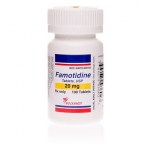- Type of Drug: Histamine H2 antagonist.
- Prescribed for: Ulcers of the stomach and upper intestine (duodenum). It is also prescribed for gastroesophageal reflux disease (GEB…) stress ulcers, and other conditions characterized by the production of large amounts of gastric fluids, to prevent bleeding in the upper intestines and stomach and formation of stress ulcers. A surgeon may prescribe Famotidine for a patient under anesthesia when it is desirable for the production of stomach acid to be stopped completely. Famotidine is the first histamine H2 antagonist to be approved for sale without a prescription in the US for heartburn.
General Information of Famotidine
Famotidine works in the same way as other histamine H2 antagonists, by turning off the system that produces stomach acid, as well as other secretions.
Famotidine is effective in treating the symptoms of ulcer and preventing complications of the disease. However, since all of the histamine H2 antagonists work in the exact same way, it is doubtful that an ulcer that does not respond to one will be effectively treated by another. Histamine H2 antagonists differ only in their potency. Cimetidine is the least potent, with 1000 mg roughly equal to 300 mg of Nizatidine and Ranitidine and 40 mg of Famotidine. The ulcer healing rates of all of these drugs are roughly equivalent, as are the chances of drug side effects.
Cautions and Warnings
Do not take Famotidine if you have had an allergic reaction to it or another H2 antagonist in the past. Caution must be exercised by people with kidney and liver disease who take Famotidine because one third of each dose is broken down in the liver; the rest passes out of the body through the kidneys.
Famotidine Possible Side Effects
- Most common: headache.
- Less common: dizziness, mild diarrhea, and constipation.
- Rare: drowsiness, dry mouth or skin, joint or muscle pains, loss of appetite, depression, nausea or vomiting, abdominal discomfort, stomach pains, ringing or buzzing in the ears, skin rash or itching, temporary hair loss, changes in taste perception, fever, swelling of the eyelids, chest tightness, rapid heartbeat, unusual bleeding or bruising, unusual tiredness or weakness, confusion, hallucination, anxiety or agitation, sleeplessness, reduced platelet counts, and impotence or reduced sex drive.
Famotidine Drug Interactions
• Enteric-coated tablets should not be taken with Famotidine. The change in stomach acidity will cause the tablets to disintegrate prematurely in the stomach.
• Antacids, anticholinergic drugs, arid Metoclopramide may slightly reduce the amount of Famotidine absorbed into the blood. No special precaution is needed.
Food Interactions
Food may slightly increase the amount of drug absorbed, but this is of no consequence; it may be taken without regard to food or meals.
Usual Dose
The usual adult dosage is either 20 to 40 mg at bedtime, or 20 mg twice a day. Dosage should be reduced in people with severe kidney disease.
Nonprescription dose: Take 1 pill (10 mg) with water, up to 2 pills a day. To prevent heartburn, take 1 pill (10 mg) 1 hour before eating or drinking anything that gives you indigestion, no more than twice a day. Call your doctor if you don’t feel better in 2 weeks.
Famotidine Overdosage
There is little information on Famotidine overdosage. Overdose victims might be expected to show exaggerated side effect symptoms, but little else is known. Your local poison control center may advise giving the victim Syrup of Ipecac (available at any pharmacy) to cause vomiting as soon as possible. This should remove any remaining drug from the stomach. Victims who have definite symptoms should be taken to a hospital emergency room for observation and possible treatment. ALWAYS bring the prescription bottle.
Special Information
You must take this medicine exactly as directed and follow your doctor’s instructions for diet and other treatments in order to get the maximum benefit from it. Antacids may be taken together with Famotidine, if needed.
Cigarettes are known to be associated with stomach ulcers and may reverse the effect of Famotidine on stomach acid.
Call your doctor at once if any unusual side effects develop, particularly unusual bleeding or bruising, unusual tiredness, diarrhea, dizziness, or rash. Black, tarry stools or vomiting “coffee-ground”-like material may indicate your ulcer is bleeding.
If you forget to take a dose of Famotidine, take it as soon as you remember. If it is almost time for your next regularly scheduled dose, skip the one you forgot and continue with your regular schedule. Do not take a double dose.
Special Populations
Pregnancy/Breast-feeding
Although studies with laboratory animals have revealed no damage to a developing fetus, Famotidine should be avoided by pregnant women and those who might become pregnant while using it. When it is essential, Famotidine’s potential risk must be carefully weighed against any benefit it might produce.
Famotidine may pass into breast milk. No problems have been identified in nursing babies, but nursing mothers must consider possible drug effects.
Seniors
Older adults respond well to Famotidine but may need less medication than younger adults to achieve the desired response, because the drug is eliminated through the kidneys, and kidney function tends to decline with age. Seniors may be more susceptible to some drug side effects.

